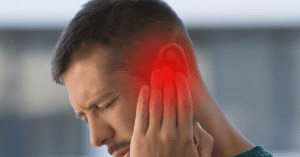A healthy diet is considered the cornerstone of a healthy body. Healthy diets high in nutrition-dense foods are vital to bodily function; therefore, it stands to reason that there may be a link between diet and tinnitus. Below, we’ll take a close look at dietary patterns, developing tinnitus, and how the two may interact.
What Does A Healthy Diet Look Like?
According to the World Health Organization (WHO), it is important to follow a balanced, nutrient dense diet that includes fruits, vegetables, legumes, nuts, whole grains, fats, protein, and carbohydrates. Basic caloric and nutritional needs will differ from person to person, however, a balanced diet is always key in staying healthy.
"Treble Health helped me reduce my tinnitus by about 80%, and now I can live my life again!"


"Treble Health helped me reduce my tinnitus by about 80%, and now I can live my life again!"
– Steve D.
Book a free consultation to learn which Treble Health solution is right for you. Join Steve and thousands more who have found lasting tinnitus relief.
Nevertheless, across cultures and groups of people, it is important to avoid drinking calories through soda, energy drinks, and fruit juice in excess; the reason for this is simple enough, as a steady stream of liquid sugar without fiber, protein, or other components can negatively impact blood sugar levels. Limiting the intake of processed sugar, processed foods, and saturated fats typically goes beyond cultural traditions, as health cannot thrive with a diet high in these products.
The Relationship Between Diet, Tinnitus, And Hearing Difficulties



Although there is no set or recommended “healthy hearing diet”, there are essential nutrients that have been proven to support your auditory system, and this suggests that eating a healthier diet can help keep ears healthy and limit the likelihood of developing ear conditions. While it may be tempting to utilize a dietary supplement to fill in the nutritional gaps, a healthy diet cannot be created through supplements in the absence of genuinely healthy foods.
- High-fat diets may increase the risk of tinnitus
- One study determined that higher intakes of calcium, iron, and fat were positively associated with a higher risk of developing tinnitus, while an increase of vitamin B12 and a dietary pattern high in meat intake were associated with decreases in the risk factors associated with tinnitus. To explain these findings, researchers have suggested that fat intake can impact the health of blood vessels, which are essential to maintain ear health. Poor blood vessel health is why heart disease and diabetes have both been linked to hearing loss. While a healthy diet is not considered a tinnitus treatment, diets high in certain nutrients can help keep ears healthy.
- Nutrients that may help support the auditory system
- Magnesium
- One study determined that magnesium may actually help protect inner ear conditions by protecting inner ear hair cells from loud noise exposure. To arrive at this conclusion, 300 subjects were given magnesium prior to loud noise exposure, and were found to experience less noise-induced hearing loss than the control group. Foods rich in magnesium include fruit, dark chocolate, almonds, and whole grains.
- Zinc
- Zinc has been shown to help repair tissues in the body and promote immune health. A diet high in zinc has also been reported to coincide with a lower incidence of tinnitus onset. While this is not the only nutrient linked to improvements in tinnitus risk factors, it can be yet another piece of the puzzle in tinnitus management and prevention. Zinc can be found in red meat, beans, nuts, dairy, and eggs.
- Potassium
- The fluid found within the inner ear, called endolymph, is partly made up of potassium. Naturally, a discussion of diet and tinnitus is not complete without a discussion of potassium. This nutrient helps convert auditory information to the electrical signals that can be recognized by the brain to process sound. Foods rich in potassium include bananas, spinach, avocado, and sweet potato.
- Vitamin B12
- Diets high in vitamin B12 have been shown to decrease risk factors for developing tinnitus. At present, the precise relationship between vitamin B12 and tinnitus symptoms is still not known, so it is not typically recommended to supplement with vitamin B12. Nevertheless, some people with tinnitus prefer adding vitamin B12 to their diet as a precaution and as part of a generally healthy diet. Foods high in vitamin B12 include beef, milk, and eggs. Vitamin B12 can also be found in dietary supplements, but a healthy diet often includes plenty of foods that provide adequate vitamin B12 levels.
- Magnesium
What About The CATS Diet?



The Caffeine, Alcohol, Tobacco, and Salt diet, or CATS diet, has grown in popularity for people with tinnitus or Meniere’s Disease. This diet is specifically tailored toward Meniere’s Disease, which can include tinnitus symptoms, but because not all tinnitus patients also have this condition, it is not typically encouraged for general hearing health. Not everyone who has tinnitus needs to limit these substances; most people with tinnitus do not need to limit or cut any of these items out of their diet.
People who do suffer from Meniere’s Disease, an inner ear disease that leads to fluctuations of hearing loss, tinnitus symptoms, and vertigo often see improvements when they follow the CATS diet. The CATS “diet” can help reduce the number of episodes experienced, but if tinnitus symptoms are not related to this disorder, it is better to seek the medical advice of an otolaryngologist or audiologist for further evaluation and tinnitus treatment.
Caffeine Intake
For some people with tinnitus symptoms, caffeine can actually elevate blood pressure levels and lead to a spike in symptoms and subsequently negatively impact hearing health. If your caffeine intake is on the higher end and you experience tinnitus symptoms, it may be time to reduce your intake or cut caffeine entirely to help alleviate symptoms. A food diary can help you identify any dietary patterns like excessive caffeine consumption that lead to an increase in phantom sounds. Dietary factors like this often go overlooked, but can be significant.
Alcohol Intake
Alcohol intake is also possible for increasing your blood pressure, and has the potential to make your blood sugar levels spike and plummet. Sustained alcohol use is considered one of the greatest and most preventable causes of both hypertension and diabetes. Because both are related to the onset of symptoms in tinnitus patients, dietary factors can be important factors to consider when developing tinnitus or experiencing a spike in symptoms.
Salt Intake
Sodium intake is yet another food item that can make or break keeping ears healthy. High sodium intake can cause an increase in blood pressure, leading to a temporary increase in symptoms. Over time, it can cause damage to blood vessels, resulting in cardiovascular damage and hypertension, which ultimately puts you at greater risk for both hearing loss and persistent tinnitus.
How Do I Know If My Diet Is Affecting My Hearing Health Or Causing Tinnitus?



When you are trying to eat to make your ears healthier, it can be useful to keep a food diary for at least a week. Keeping this type of diary can give you practical and meaningful insights into your eating habits and help you determine if you are eating an overall healthy diet to support your hearing health. Food diaries allow you to track both dietary patterns and tinnitus reactions; this way, if you notice a pattern of increased symptoms with certain foods–with higher caffeine intake, for instance–you can limit those foods. If you do this, track how your symptoms respond. In some cases, you may find that you do not have any dietary triggers. In others, you can identify a simple way to support ear health and reduce your risk for ear conditions like tinnitus.
Does This Mean You Should Change Your Diet?
Not necessarily! Typically, a doctor or audiologist will recommend that you keep a food diary, tracking food, dietary supplements, and drinks you consume, and measure all of those against your tinnitus symptoms to determine if anything coincides. If you notice that tinnitus symptoms increase in response to a specific food, drink, or any dietary supplements, you can then remove those items from your intake. If you cannot find any ties between your tinnitus symptoms and intake, you can continue to consume an overall healthy diet and assume that tinnitus and other inner ear conditions are not related to your diet.
Even if you do not have any tinnitus symptoms that respond to foods, an extremely deficient diet or diet that is not filled with adequate nutrients can negatively impact health as a whole, including mental health, which can impact tinnitus prevalence and increase tinnitus symptoms. While it is not yet certain whether a healthy diet can prevent tinnitus, or directly impact tinnitus perception, an overall dietary pattern of healthy eating can help support the human body, including the health of your ears.
From following a diabetic diet, to eating an overall healthy diet, there are ways to address certain inner ear conditions like tinnitus by ensuring that you have enough nutrients in your diet. Although diet is not used to treat tinnitus, it can be a great source of support for anyone whose food intake matches high risk foods. More research is needed to fully understand the relationship between food and tinnitus symptoms, but patients with tinnitus can use nutrition to reduce high blood pressure, support cardiovascular and blood sugar health, and increase their ear health.
Next Step: Book Free Consultation
- 75% of patients reduced their tinnitus within three months after following our recommendations.
- "I feel like Treble Health literally gave me my life back." - Randy S. (verified customer)
- Join thousands of people who have reduced their tinnitus after scheduling a free consultation.




















